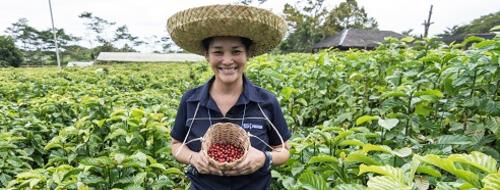Climate change is one of the greatest threats to life on Earth today, with alarming and long-term effects that include increasing temperatures, heat waves and heavy precipitation, as well as melting ice and permafrost resulting in rising sea levels.
In our part of the world, the Intergovernmental Panel on Climate Change of the United Nations (UN) projects that freshwater availability will decrease in Central, South, East and Southeast Asia by the 2050s; coastal areas will be at risk due to increased flooding; and death rates from disease associated with floods and droughts are expected to rise in some regions.
Climate Action is a UN Sustainable Development Goal with the objective of addressing climate change and its impacts. Specifically, it aims to reduce greenhouse gas emissions by 7.6% each year to reach the goal of the Paris Agreement to limit global warming to 1.5°C.
Essential to the Paris Agreement are the Nationally Determined Contributions (NDCs) that embody the commitments of each country to reduce carbon emissions and combat climate change. Locally, President Rodrigo Duterte has approved the Philippines’ NDC to reduce and avoid carbon emissions by 75% by the year 2030.
As the world’s largest food and beverage manufacturer, Nestlé has a global ambition and a roadmap to achieve net zero greenhouse gas emissions by 2050. We are urgently accelerating our efforts, building on more than a decade of work, to reduce emissions. With the size, scale, and reach of our operations that can help make an impact, we are called upon to take a leading role in tackling climate change.
There is growing awareness and concern over environmental sustainability among consumers, and increasingly, they choose companies that do good for the planet
At Nestlé Philippines, one of the largest Nestlé markets worldwide, we are deeply committed to pursuing our local environmental goals which support the attainment of the country’s NDC. With climate change as a key priority, we have in place a whole-of-business approach to source responsibly, transform our operations, and shape a waste-free future. Our employees are fully on board and prepared to do their share in the tasks involved. As a company of 110 years, we want to leave a legacy of effectively caring for the planet.
One of the greatest challenges we face as a food manufacturer is plastic waste, the Philippines being the third largest source of plastic in the oceans. Building on years of effort, we have put in place a multi-faceted program for packaging innovation and reduction, collection and recycling, and consumer education. Last year in August, we achieved our most important environmental milestone thus far, becoming the country’s first multinational FMCG company to attain plastic neutrality. Since then, we have collected and diverted 18,000 metric tons (MT) of plastic waste, equivalent to the amount of plastic that we generate in our packaging. We have also fully shifted from plastic to paper straws for our locally manufactured ready-to-drink products, eliminating about 130 MT of plastic in 2020
In 2017, we started using renewable energy. Today, all our facilities in Luzon run on 100% renewable electricity. Moreover, our factories are driving energy and water efficiency programs on a sustained basis. We have been helping our business partners boost green practices and many of them have achieved operational efficiencies and cost savings.
In our sustainability journey, we seek to uplift the communities that we work with. Through our Nescafé Plan and the Common Code for the Coffee Community or 4C, Robusta coffee farmers in Mindanao are learning regenerative agriculture and sustainable coffee production. Among our efforts, we are helping 1,500 smallholder farmers to reduce their carbon footprint.
We continue to find ways and pursue various initiatives to accelerate the way to net zero. The going poses difficulties and hurdles, but we are eager to learn and act quickly as we move forward. We are determined to help make a difference as a force for good, as a Kasambuhay for the Environment.
Climate change is a crisis that needs to be addressed immediately through collective action, with accountability and transparency. Multi-stakeholder partnerships are crucial. The private sector, with its industries that generate significant carbon emissions, must join hands with government, consumers, and the rest of society to face this pressing challenge head-on. There is no time to lose. We can succeed in mitigating greenhouse gas emissions only if we work together. Tackling climate change can’t wait, and neither can we.




